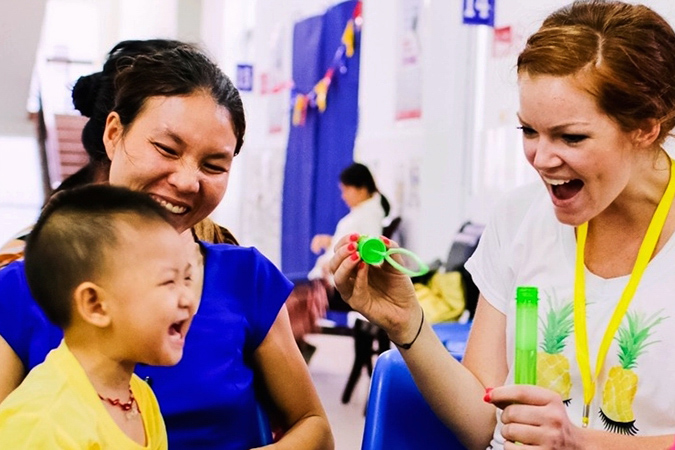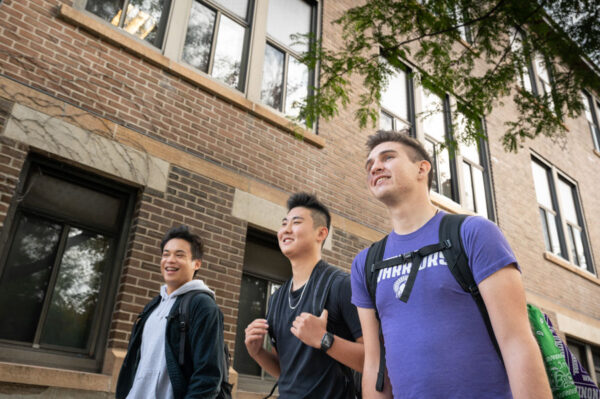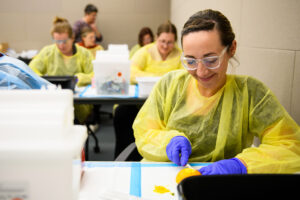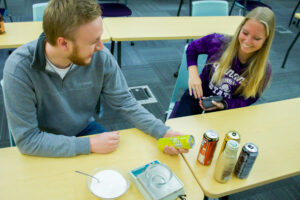
Public Health: Community Health
Bachelor's
PROGRAM SNAPSHOT
Empower people to live healthier lives. Witness the minor changes that lead to major impacts. Become the go-to person for health in your community.
A healthy community starts with a healthy individual.
Public health professionals who specialize in community health give people the information and tools they need to improve their own health and the health of their communities.
If you want a career that lets you be a communicator, educator, and researcher for a variety of health topics all in one, then the Public Health: Community Health major is for you.
With this program at Winona State, you’ll visit community centers, coordinate health initiatives, and serve people of all ages.
You’ll also hone your skills in the field with more than 600 hours of practicum and internship experience.
This major is available through WSU’s Department of Health, Exercise & Rehabilitation Science.
As a Public Health: Community Health major, you’ll learn how to design and execute health promotion campaigns.
You’ll also:
- practice writing grants to secure funding for health program initiatives.
- understand how physical, social, and economic factors all affect our health.
- know how policies and politics affect health outcomes at the local, state, or national level.
- explore how the burden of disease and the promotion of health changes in health care systems around the world.
Your classes will prepare you for careers as a health educator and promoter in government agencies, non-profit organizations, and district and county health departments.
You’ll further develop your skills as a health educator through hands-on class projects.
Aside from major- or minor-specific requirements, you’ll need to complete additional requirements through the General Education Program (GEP) to earn your degree from Winona State University.
Learn More about the GEP
In the Classroom
Throughout this program, you’ll practice, brainstorm, plan, and evaluate public health programs.
You’ll also create projects and presentations that address current and emerging issues in public health and community health.
You could find yourself studying Seasonal Affective Disorder of WSU students and diseases ranging from the Zika virus and Lyme disease to syphilis and HIV.
During an upper-division program planning course, you’ll partner with community organizations to plan health promotion campaigns.
Recent campaigns that students have done include How to Safely Work Out, Food Waste, Sun Safety.
And during an upper-division grant writing class, you’ll learn how to write grants for funding to support community health education programs.
Employers across the country recognize the Certified Health Education Specialist (CHES) credential when hiring job candidates.
As a Public Health: Community Health major, you’ll take classes that prepare you to take the CHES exam through the National Commission for Health Education Credentialing, Inc.
Your core classes will explore the Areas of Responsibilities, offer a solid foundation for CHES exam preparation.
Be one step closer to becoming a health promoter and educator by getting the real-world preparation you need along with your degree.
Winona State offers students access to First Aid and CPR certification through the American Red Cross.
You can also earn Mental Health First Aid certification through the National Alliance on Mental Illness (NAMI) to recognize early signs or symptoms that someone with a mental health challenge may have and refer them to the right support services.
If you want to become a community health specialist, you need a master’s degree.
You can earn your bachelor’s degree in Public Health: Community Health from WSU and your Master of Public Health (MPH) from St. Ambrose University in only 5 years with the 3+2 path.
During your final undergraduate year, you’ll earn credits that count toward both degrees.
This saves you time and money and makes you a competitive job candidate.
Beyond Campus
As a Public Health: Community Health major, you’ll complete a 600-hour hands-on internship before you graduate.
Students in this program have interned as health educators, worksite wellness program coordinators, and environmental health inspectors.
This field experience will give you supervised practice with a variety of communities and health promotion needs.
In addition to your internship, you’ll complete more than 60 practical hours in the community.
Your practicum allows you to gain experience developing several health education programs based on community members’ needs.
Students in this program have completed their practicums in data entry, community outreach, peer education, and community education.
Apply what you learn in the classroom by traveling the world. At WSU, you can earn credit that counts toward your degree while exploring the globe.
Learn about health promotion in Peru, food systems in Hawaii, and health, exercise, and medicine in England and Ireland.
Or dive into the business of health care in Paris and child welfare and health systems in Jamaica.
Complement your studies and meet other students who are passionate about community health through campus clubs and organizations.
Join the Public Health Club or LeadHERS for Winona State HERS Alumni.
You can also become a student health and wellness advocate.
According to the Bureau of Labor Statistics, the field for health education specialists and community health workers is predicted to grow 12% by 2031.

Bachelor's

Bachelor's

Bachelor's